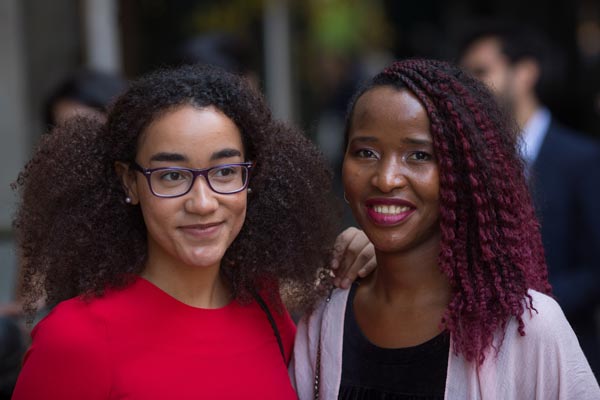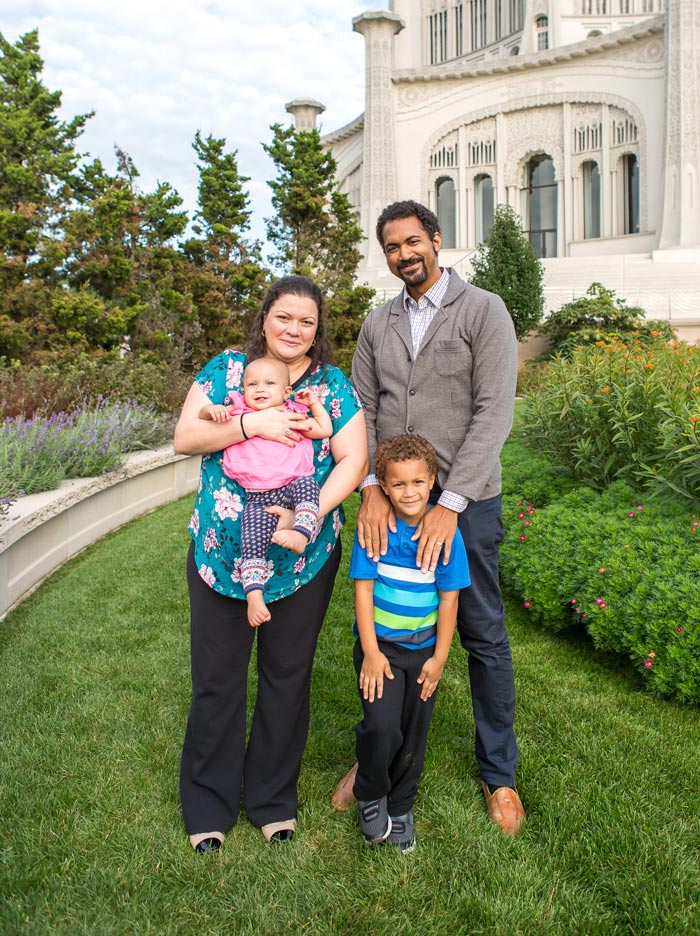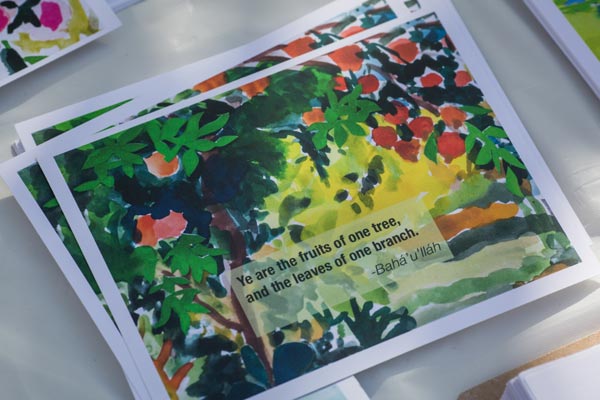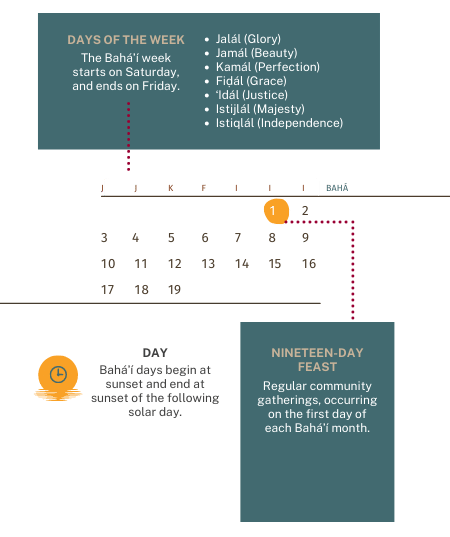Since the earliest beginnings of human history, the measurement of time has been fundamental to the organization of societies.
The adoption of a new calendar in each religious era is a symbol of the power of divine revelation to reshape human perception of material, social, and spiritual reality. Through it, sacred moments are distinguished, humanity’s place in time and space reimagined, and the rhythm of life recast.
Bahá’ís commemorate 11 holy days each year. These occasions are usually observed with community gatherings in large or small settings, with programs befitting the significance of the day.

19 Bahá’í Months
The Bahá’í calendar consists of 19 months with
19 days in each month. There are 361 days in a Bahá’í calendar year and 4 to 5 intercalary days.
In keeping with the principle governing the gradual unfoldment and progressive application of the Teachings, the provisions of the Badí‘ calendar have been set forth over time. The Báb introduced the calendar and its broad pattern of periods and cycles, months and days. Bahá’u’lláh provided essential clarifications and additions. Aspects were elucidated by ‘Abdu’l‑Bahá, and arrangements for its adoption in the West were put in place at the direction of Shoghi Effendi
“The Báb, the Primal Point of a new creation, brought humanity into a new division of time in a calendar of nineteen months. All through our past heritage the months of the years and the days of the week have borne the names of pagan feasts and Roman holidays. The Báb swept these ancient landmarks away, and replaced them by the Qualities of: Splendour, Glory, Beauty, Grandeur, Light, Mercy, Words, Perfection, Names, Might, Will, Knowledge, Power, Speech, Questions, Honour, Sovereignty, Dominion, and Loftiness. Meditating upon these sublime attributes, man is enabled to gaze beyond the curve of time, wherein the swing and change of planetary movements exists, to the eternal qualities that stabilize the soul.”
Shoghi Effendi, Principles of Bahá’í Administration, p. 53
FURTHER READING
The Bahá’í Faith has its own calendar, the Badi’ Calendar, which was standardized and adopted globally for Bahá’í observances in 2015. The Badí’ Calendar is a solar calendar consisting of 19 months of 19 days each (361 days), with the addition of either four or five “Intercalary Days” to adjust the calendar to the solar year. The days and months are named after the attributes of God. The Nineteen Day Feast, the primary community gathering for Bahá’ís in each town and city, is held on the first day of each Bahá’í month.
Bahá’í Months (181 B.E.)
Bahá (Splendour)
Jalál (Glory)
Jamál (Beauty)
‘Azamat (Grandeur)
Núr (Light)
Raḥmat (Mercy)
Kalimát (Words)
Kamál (Perfection)
Asmá’ (Names)
‘Izzat (Might)
Mashíyyat (Will)
‘Ilm (Knowledge)
Qudrat (Power)
Qawl (Speech)
Masá’il (Questions)
Sharaf (Honour)
Sulṭán (Sovereignty)
Mulk (Dominion)
Ayyám-i-Há (Intercalary Days)
‘Alá’ (Loftiness)”
corresponding dates
March 20, 2024
April 8, 2024
April 27, 2024
May 16, 2024
June 4, 2024
June 23, 2024
July 12, 2024
July 31, 2024
August 19, 2024
September 7, 2024
September 26, 2024
October 15, 2024
November 3, 2024
November 22, 2024
December 11, 2024
December 30, 2024
January 18, 2025
February 6, 2025
February 25 to February 28, 2025
March 1 to March 19, 2025 – Month of Fasting
The Bahá’í New Year coincides with the spring equinox in the northern hemisphere. It can fall on March 20 or 21, and the remaining Feast and Holy Days are adjusted accordingly. Calendar dates for the next 50 years are listed here
The last month in the Bahá’í calendar is dedicated to the Fast. During this time, Bahá’ís between 15 and 70 years of age do not eat or drink for 19 days from sunrise to sunset and set aside time for prayer and meditation. Exemptions for illness, pregnancy, nursing mothers, extended travel and arduous physical labor.
Holy Days 2024
(For all holy days, observance begins at sunset on the evening before)
March 20, 2024* Naw Rúz, the Bahá’í New Year.
April 20, 2024* First Day of Ridván (meaning “Paradise” in Arabic) — the most important of the Bahá’í Holy Days. It is the day on which Bahá’u’lláh declared His mission as a Messenger of God in the Garden of Ridván.
April 28, 2024* Ninth Day of Ridván, the day on which Bahá’u’lláh’s family joined Him in the Garden of Ridván.
May 1, 2024* Twelfth Day of Ridván, the day on which Bahá’u’lláh and His family left the garden to travel to Constantinople.
May 23, 2024* Declaration of the Báb, the anniversary of the Báb’s announcement of His mission in 1844.
May 28, 2024* Ascension of Bahá’u’lláh, marking the passing of Bahá’u’lláh in 1892.
July 9, 2024* Martyrdom of the Báb, who was executed in 1850.
November 2 2024** Birth of the Báb, 1819–1850. The Báb (meaning “Gate” in Arabic) is considered to have paved the way for the incarnation of Bahá’u’lláh, similar to the relationship between John the Baptist and Jesus Christ. Born in 1819 in Shiraz, Iran, The Báb’s mission was to awaken the people to the fact that a new period in human history had begun. He called for spiritual and moral reformation – a revolutionary message in his time.
November 3, 2024** Birth of Bahá’u’lláh, 1817–1892. Bahá’u’lláh was born in 1817 in Tehran, Iran and established the Bahá’í Faith whose principal teachings are the oneness of humanity, the oneness of religion and the oneness of God. The appearance of Bahá’u’lláh has been likened to a spiritual springtime, destined to spread peace and unity around the globe.
November 25, 2024 Day of the Covenant, commemorating Bahá’u’lláh’s appointment of His son, ‘Abdu’l-Bahá, as the One to whom His followers should turn after His passing.
November 27, 2024 Ascension of ‘Abdu’l-Bahá, marking the passing of ‘Abdu’l-Bahá in 1921.
February 26 – 29, 2024 Ayyám-i-Há (also known as the Intercalary Days), a period of celebration devoted to charity, gift-giving and festivities prior to the annual period of fasting.
March 1 – 19, 2024 The month of fasting, during which Bahá’ís from the age of 15 abstain from food and drink between sunrise and sunset. There are exemptions, including for those who are ill, elderly, traveling, pregnant or breastfeeding.
- *Bahá’ís suspend work and school on these Holy Days.
** The Bahá’í Holy Days are set and move according to a solar calendar. However the Holy Days marking the birth days of the Báb and Bahá’u’lláh are set and move according to a lunar calculation.







